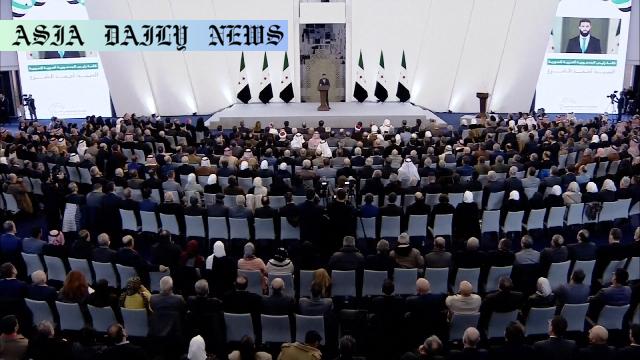Syria Dialogue: The interim government leads a national conference with 500 participants to discuss reforming Syria’s future.
Syria’s interim government launches national dialogue to plan the nation’s reform and future leadership.
Interim President Ahmed al-Sharaa emphasizes unity and disarmament in his keynote speech.
500 participants, despite diverse backgrounds, discuss new constitutional drafts and justice system reforms.
Kurdish groups were notably absent, raising concerns over full national representation and unity.

Syria’s National Dialogue: A Turning Point in History
In the aftermath of the fall of Bashar al-Assad’s regime, Syria’s interim government has embarked on a historic journey to reshape the country’s future. A national dialogue conference commenced in Damascus, attended by nearly 500 participants from various ethnicities and religious groups. This gathering, though delayed by over a month, marks a significant attempt to unify a fragmented nation and inspire collective debate over the formation of a new constitution and the reformation of the judicial system.
Efforts to Reshape Syria’s Political Landscape
Interim President Ahmed al-Sharaa inaugurated the conference with an impassioned speech championing unity and collaboration. Highlighting the end of decades of oppressive rule, he affirmed that “Syria has been returned to its people.” The interim leader presented a vision emphasizing the importance of state-controlled arms and the intent to disarm pockets of resistance still loyal to the former regime, as well as Kurdish forces operating in the north. These steps are seen as pivotal for establishing order and revamping Syria’s security and military infrastructures.
Challenges to Unity Amid Exclusions
While this conference represents a hopeful turning point for Syria, it has not been without controversy. Kurdish groups, a key player in the ongoing conflict, were notably absent from the invitee list. Their exclusion raises fundamental concerns regarding the inclusivity and efficacy of the dialogue’s outcomes. Critics argue that without Kurdish representation, creating a truly unified vision for Syria will remain a distant hope. The interim government, however, insists the conference is a stepping stone toward broader engagement and reconciliation.
Exploring Constitutional and Judicial Reform
The conference’s agenda centers heavily on drafting a modern constitution and rebuilding trust in Syria’s judicial system. Decades of corrupt governance have left the country with institutions that are deeply fragmented and distrusted. Participants aim to create frameworks embodying transparency, justice, and accountability, although whether they can overcome various political and cultural divides remains to be seen.
Nation-Building in the Shadow of Conflict
The national dialogue conference underscores the challenges and responsibilities that come with nation-building after prolonged conflict. Establishing unity and trust among disparate groups while addressing contentious issues such as arms control and the role of the military will be critical. Additionally, the government must ensure inclusivity, reaching out even to marginalized groups like the Kurds, whose absence weakens the credibility of the dialogue’s goals.
The Road Ahead: Opportunities and Obstacles
While the dialogue suggests promise, it also underscores the fragile state of post-Assad Syria. The exclusion of key players and prevailing intergroup mistrust reflect the deep wounds that decades of authoritarian rule and civil strife have left on the nation. The journey toward rebuilding will require not just political reform but genuine efforts toward healing and reconciliation among Syria’s people. Without inclusivity and genuine efforts for peace, the interim government risks perpetuating divisions instead of healing them.



Commentary
An Opportunity for Renewal Amid Challenges
The launch of this national dialogue conference is undoubtedly a monumental step for Syria. After years of devastation, hope finally emerges in the form of collaborative committees, constitutional discussions, and judicial reforms. Yet, while the intentions to unify the nation shine through, the road ahead is fraught with immense challenges. True national unity cannot be achieved without including all factions in the conversation, especially the Kurdish groups whose absence looms heavily over this gathering.
Missed Chances for Inclusivity?
The absence of Kurdish representatives signals a significant gap in the inclusivity and credibility of the dialogue. Without their perspectives, the proposed plans may fail to represent the full diversity of Syrian society. Additionally, the process of disarming various factions, while necessary for peace, will likely encounter resistance. Balancing security needs with inclusivity demands both strategic tact and genuine goodwill from the interim administration.
Moving Forward with Caution and Vision
Ultimately, Syria’s leadership must approach this pivotal moment with a commitment to fairness and collaboration. Forging a future based on justice and democracy will require not just well-crafted frameworks but also significant trust-building among the population. This conference, while far from perfect, represents a glimmer of hope. It is now up to Syria’s interim government and civil society to transform this moment into meaningful change for all.